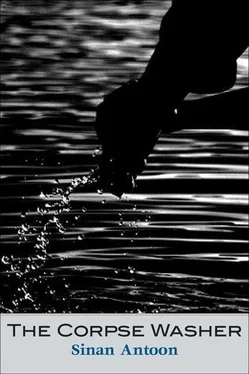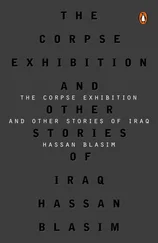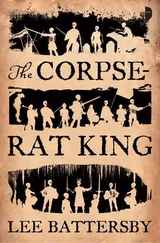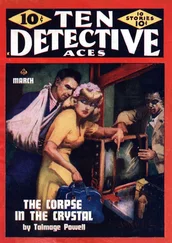I stood to the right of the bench and removed the sheet from the dead man’s face and body. He was naked except for white underpants. His skin was yellowish. He had short brown hair, a wide forehead, and a pointed nose. There was a mole on his right cheek next to his moustache. His lips were dry and looked thirsty. He had scattered patches of hair on his chest between the nipples. They narrowed to a line trailing down his belly. He was wire-thin. His bones and ribs were visible. I put my arm under his neck to lift him and pull the sheet from under his body. I got goose bumps.
I rested his head on the bench again. Mahdi put his hands under the dead man’s knees to lift the rest of his body. I pulled away the remainder of the sheet and gave it to Mahdi, who folded it and handed it to the uncle. Mahdi brought me another white towel and handed it to me. He held a pair of scissors in his other hand. I put the towel over the man’s waist and took the scissors from Mahdi. I lifted the towel a bit without showing anything and started to cut away his underwear from the side. I went around and did the same to the other side. I removed the underwear and gave it to Mahdi, who put it in a plastic bag he had brought and gave it to the uncle. I returned the scissors to Mahdi and then placed the palms of my hands on the dead man’s belly and rubbed gently. It felt like hard plastic. I filled a bowl with water and poured some on his face. I inserted my index finger into his mouth and rubbed his teeth. Mahdi had started mixing in the ground lotus, which formed a foam and spread a pleasant smell. I poured another bowl of water over the man’s head and washed his face. I looked at Mahdi and realized it was time to turn him on his side. We did so as I repeated, “Forgiveness, O Lord.” I washed his right side from the head all the way down to the toes and repeated the same thing on his left side. Then we washed him again with water and camphor and then a third time with pure water.
For half an hour the only sounds were the splash of water and what I muttered. We dried him and shrouded him and put two branches of palm in the coffin.
After two years of work alongside Hammoudy, Mahdi had mastered the tasks of the assistant and the rhythms of washing. He was always ahead of me, anticipating the next step and preparing for it. This lessened my anxiety that I would do something wrong. When we went to the corner to fetch the coffin, the two young men got up. We put it on the ground next to the bench and placed the body in it. The uncle asked again about my fees and I told him that there was no set figure. He gave me ten thousand dinars. I thanked him and offered my condolences once again. They carried away the coffin and left.
I asked Mahdi about the amount as I put the bills in my pocket. He said it was very good and that Hammoudy used to ask for twenty thousand if the deceased’s family wanted the special shroud with the fancy print and supplications. I suggested we wash the bench and rearrange the bowls. He said he would do it himself.
I looked for the radio in the side room, but couldn’t find it. Mahdi said he didn’t know anything about a radio. I decided to bring a small one from home to keep us company. I realized that I’d forgotten to say, “I wash this corpse … ” I sensed that Imam Ali was looking at me from the painting, but I didn’t detect any censure or anger in his eyes.
Death was kind to me on my first day and gave me a long rest. No one else came until noon. I remembered the sufurtas and the food my mother had prepared for me. Mahdi hadn’t brought any food with him. I gave him some money and asked him to get us two falafel sandwiches from Abu Karima’s and to get two cans of soda, too. He smiled and seemed eager to go on the errand.
I sat waiting for him and leafed through my old notebook again. I found a few empty pages and decided to write down the names of the dead I was going to wash. I wrote the date and then “Jasim.”
Names filled one notebook after the other in the days and months that followed.
I cannot wake up from this endless nightmare of wakefulness. Some people go to work behind a desk on which papers are piled. Others operate machinery all day. My desk is the bench of death. The Angel of Death is working overtime, as if hoping for a promotion, perhaps to become a god. I walk down the street and look at people’s faces and think Who among them will end up on the bench next for me to wash?
Every day of the week was difficult, but Thursday was the day al-Fartusi’s refrigerated truck arrived with the weekly harvest of death: those who were plucked from their families and lives, tossed into the garbage in Baghdad’s outskirts, thrown into the river, or rotting in the morgue. Most of them had no papers or IDs and no one knew their names. Instead of names, I wrote down the causes of death in my notebook: a bullet in the forehead, strangulation marks around the neck, knife stabs in the back, mutilation by electric drill, headless body, fragmentation caused by suicide bomb. Nothing could erase the faces. My memory became a notebook for the faces of the dead. I was on my way home one day when I realized that aside from Mahdi and my mother, I was living my days exclusively with the dead.
On a February morning in 2006, I was getting dressed to go to work when I heard my mother wailing downstairs. I ran down barefoot and saw her sitting in front of the TV beating herself and crying, “O God, O God.”
“What’s wrong, mother? What happened?” I asked as I held her hands and begged her to stop. On the TV were images of a destroyed mosque.
Through her tears she said, “They bombed the Askari shrine. I wish God had blinded me so I wouldn’t see it like that.”
I tried to calm her down. I, too, felt sad, but for different reasons. I had visited the shrine in Samarra more than once. That is where the Mahdi is said to have disappeared and gone into occultation to return at the end of time. I had felt awe and sadness when I was inside it and could still see my mother crying as she held on to the golden window surrounding the mausoleum. I was quite young back then and she had stood behind me and had kept me close so that I wouldn’t get lost in the crowds. I felt the cold window as my cheek pressed against it. I felt the warmth of my mother’s body pressing me from behind as she muttered her supplications and prayers. She cried as she mentioned Ammoury’s name and then mine and my sister’s and asked the imam to protect us. I cried along with her. All those pleas and tears did not work. Not for Ammoury. When we were in school we used to go on trips to Samarra to visit the spiral ziggurat. We would climb all the way to the top and look out at the golden dome of the shrine. It looked like a star that has fallen from the sky and now rested on earth after being dipped in golden water.
The band at the bottom of the TV screen scrolled by with condemnations and statements from every side. I realized that matters would deteriorate even further. Corpses would pile up everywhere. My mother was afraid that other domes would be blown up. “Who can stop them if they want to blow up al-Kazim. God help us!”
“God help us, but please take it easy and calm down. They won’t blow up al-Kazim.”
“I don’t want to calm down. You are way too calm about this. Didn’t they fire rockets at it a few months ago? Aren’t there explosions every year during ‘Ashura? You just don’t care about Shiites.”
I was about to tell her that she was right in a way. I had come to a point where I hated everyone equally, Shiites and Sunnis alike. All these words were suffocating me: Shiite, Sunni, Christian, Jew, Mandaean, Yazidi, infidel. If only I could erase them all or plant mines in language itself and detonate them. But here I was, slipping into the very same language of bombing and slaughter.
Читать дальше












